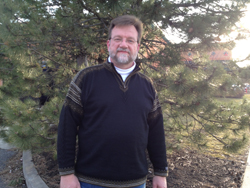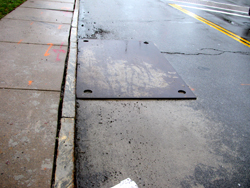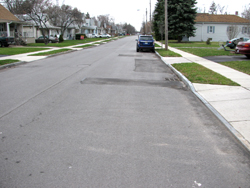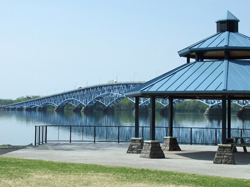Skurka Describes City As 'Slipshod, Indifferent to Safety'
By Frank Parlato
The Niagara Falls Reporter revealed last week that Niagara Falls City Engineer Jeffrey Skurka took a medical leave after Mayor Dyster relieved him of a significant portion of his duties, including monitoring two major road construction projects in the city.
Skurka spoke with the Reporter this week to explain some of the difficulties he has faced in his position, describing a city in disarray, one where he inherited problems created by a longstanding inability of the Dyster Administration to hire a qualified engineer for the city.
Skurka says from the day he arrived in July of 2011, he saw a city that “was slipshod and indifferent to safety."
The day before he began, Kevin Johnson, 44, of Niagara Falls, died after he fell into an uncovered catch basin on 17th Street between Pine and Elmwood while riding a bicycle.
Contractors working on the road said that the road plate used to cover the basin was stolen.
Skurka told the Reporter, "Why do you think they have four holes on the outside corners of road plates? The holes are there so they can be pinned down into the pavement. Then they won’t be stolen. This simple, obvious safety procedure, which I always require, would have prevented Mr. Johnson's death. On the day I began work, I ordered all road plates must be pinned down in the future."
Unrelated to Johnson’s death but on point with Skurka’s claims, a photo taken last week of work done by the city Water Board shows a road plate that is not pinned down into the pavement.
But that was just opening day. Skurka recalled his public fight with council member Charles Walker over a traffic signal in front of the Como Restaurant on Pine Avenue.
He defied Walker when he told him to design plans for the signal.
"A traffic signal in midblock, despite the fact that a sensational accident occurred there, is not warranted. More lighting, not a traffic signal, is warranted." Skurka said. "The city hired an outside engineer to design it, against my advice.
"The New York State Manual on Uniform Traffic Control Devices for Streets and Highways suggest that a traffic signal there will make the road more dangerous, increasing the probability of rear-end collisions. I was not going to risk my engineering license on a plan that will actually make the street more unsafe."
State engineers also reviewed the plans and concluded that the light was 'not warranted' and that they could not recommend installing a light there. The city’s traffic advisory commission arrived at the same conclusion.
Nevertheless, Walker said the need for a light there was a "special circumstance," chastised Skurka in council, and later proposed a resolution that cut Skurka's salary from $96,000 to $78,000, a move that was supported by the other council members and that Skurka says was "retaliatory."
A traffic signal is now hanging on Pine Avenue in front of the Como Restaurant and is awaiting electrical connection.
Skurka, during his interview, named a host of apparently ineptly managed projects. Among them were a 72nd Street sewer line job completed before he was hired.
"The contractor who did the work broke two sanitary sewer laterals," Skurka said. "In other words, the people living in two houses, through no fault of their own, flushed their raw sewage under the road. After a while, it backed up and blocked the sewers.
"It was known before I was hired that the contractor broke the lines. However, the city did not require the contractor to fix it and it lingered, with raw sewage under the road, until I was hired and demanded the contractor fix his mistake."
As records show, Skurka was overruled by the mayor and the city decided to pay an additional $30,000 for the contractor's mistake.
"The reason they gave me was that the work was done more than a year ago and the bond the contractor had put up expired. In other words, they knew about it, did nothing about it for more than a year, then, when I tried to correct it, they allowed the taxpayers to pay for it. We are having a similar situation on Tenth Street where Sue-perior broke sewer lines. My point is, get the contractor out there to fix it or go to the bonding company. The mayor overruled me there too."
Then there was LaSalle Waterfront Park.
Before Skurka was hired, Wendel Engineers designed plans for the new park and asked for additional soil borings since the ones in the city's possession were outdated.
According to Skurka, a city hall official decided to use the old soil borings to save the city about $2,500.
The city broke ground only weeks after Skurka was hired. Shortly afterward, Skurka halted construction. "I discovered pilings for the gazebo did not reach bedrock but rested on sand, something new soil borings test would have certainly revealed."
While Skurka had no decision-making role on the plan to use the old borings, and potentially saved the city an untold amount of money by halting the work and insisting that buildings not be built on unstable ground, nevertheless, some on the council blamed Skurka for not catching the mistake earlier.
Skurka was immersed in a sea of criticism.
The Resetarits Construction Corp. sued the city over its alleged refusal to pay $294,670 for cost overruns on the Customs House restoration project.
Resetarits completed the work in question before Skurka was hired. Skurka noted that the plans were not designed according to American Institute of Architects' specifications but instead used New York State DOT specifications."In other words, the city used specs for a road not a building in the boiler plate portion of the contract," said Skurka, suggesting that the lawsuit will allege that this may have contributed to some of the change order problems.
Skurka received a subpoena last week from Resetarits' lawyer, Lipsitz Green of Buffalo, in order to be deposed as a witness in this case.
As Skurka went on explaining, a pattern was emerging.
One could argue he was spinning it his way, but public records and documents support some of his contentions.
Take, for instance, Lewiston Road.
Man O' Trees, the first contractor on the incomplete reconstruction of Lewiston Road, sued the city for breach of contract, fraud and defamation and walked off the job.
Yet, before Skurka was hired, Man O' Trees had been paid more than 85 percent of the total job, although less than 50 percent of the work was complete, giving the contractor ample incentive to walk off the job with the money already pocketed and pick a fight with the city.
Then there was the Hope VI Center Court lighting fiasco.
Skurka said the developer, Norstar, should pay for the lights in front of the public housing project, a plan that was designed and approved before Skurka came to work for the city.
While Skurka fought to get Norstar to pay for and install the lights, the dark street prompted council members to demand fast action. Walker accused Skurka of not working fast enough and actually yelled at him at a council meeting, saying Skurka failed to obtain "proper designs" on file in the planning department which, Walker pointed out, was just a few steps down the hall from Skurka's office.
Skurka told Walker that he did get the so-called "proper designs" from the planning department.
"Those plans," Skurka said, "consisted of only little 'circles' where light posts should go, and lacked a single detail like pole heights, wattage or a photometric plan that would detail how much light should be used. The plans were total garbage. If you are concerned with safety, you do it the right way. The planning board approved a project that did not have a lighting plan. In the end, it wound up costing the taxpayer's money.”
After the council cut his salary and in an environment where Walker repeatedly used his position to publicly scold Skurka at council meetings, Skurka said he began to look for a new job.
"After Dyster failed to support me, I realized that the mayor as well as some of the council wanted me to do things that go against the ethical principles of sound engineering. I plan to file a complaint to the Board of Professional Engineers and ask them to make an investigation."
Once again the city is without an engineer, and once again Dyster and his favored consultants and contractors are free to do as they please with the taxpayer’s money.




